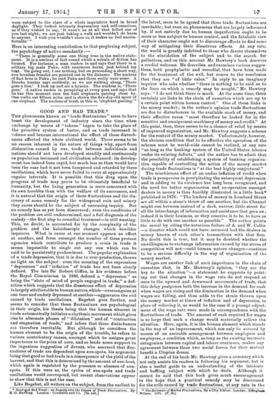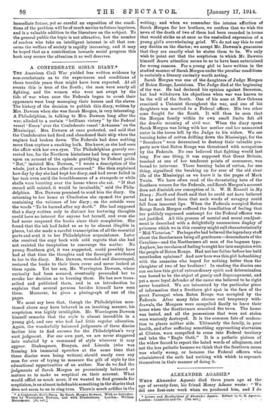GOOD AND BAD TRADE.*
TEE phenomena known as " trade fluctuations" seem to have beset the development of industry since the time when exchange by means of " tokens " began to take the place of the primitive system of barter, and as trade increased in volume and became international the effect of these disturb- ances affected the whole civilized world. There seems to be no reason inherent in the nature of things why, apart from dislocation caused by war, trade between individuals and nations should not have developed steadily and continuously as population increased and civilization advanced: its develop- ment has indeed been rapid, but much less so than would have been the case had it not been hampered and retarded by these oscillations, which have never failed to recur at approximately regular intervals. It is possible that this drag upon the progress of trade may prove to be ultimately beneficial to humanity, but the living generation is more concerned with its own troubles than with the welfare of its successors, and it is natural that the origin of these fluctuations and the dis- covery of some remedy for the widespread ruin and misery they cause should be the subject of unceasing inquiry. But no remedy has as yet been discovered; even the conditions of the problem are still undetermined, and a full diagnosis of the malady—the first step to remedial treatment—is still wanting. This, no doubt, is accounted for by the complexity of the problem and the kaleidoscopic changes which bewilder inquirers. What is cause at one moment appears as effect at another, and from amongst the number of these protean agencies which- contribute to produce a crisis in trade it seems impossible to single out any one which can be said to be peraistently predominant. The popular explanation of a trade depression, that it is due to over-production, throws no light on the subject : even the meaning of the expressions ‘. depression " and " inflation " of trade has not been clearly defined. The Into Sir Robert Giffen, in his evidence before the Royal Commission in 1886, defined a " depression " as being the "state of mind of people engaged in trade," a defi- nition which suggests that the disastrous effect of depression is largely attributable to human nature,which—oversanguine at one time and unduly depressed at another—aggravates the evil caused by trade oscillations. Bagehot goes further, and seems to consider that these fluctuations are psychological in their origin, his thesis being that the human element in trade automatically initiates a rhythmic movement which gives rise to alternate phases of " dilatation " and of "contraction and stagnation of trade," and infers that these disturbances are therefore inevitable. But although be considers the human element to be the origin of the trouble, he refers to various contributory causes, amongst which he asaigns great importance to the price of corn, and so lends some support to the ingenious suggestion of Jevons, who assumed that flue- tuations of trade are dependent upon sun-spots, his argument being chat good or bad trade is a consequence of the yield of the harvest, and that this is determined by the amount of sun-heat, which again is regulated by the presence or absence of sun- spots. If this were so, the cycles of sun-spots and trade oscillations would correspond, but recent observations appear to show that this is not the case.
Like Bagehot, all writers on the subject, from the earliest to
• Good wad Bad Trade an Inquiry into the Canasta of Trade Illocnoniona By E. G. lialftrey. London Constable and Co. [Be. net) the latest, seem to be agreed that these trade fluctuations are inevitable; but even so, phenomena that are largely influenced by, if not entirely due to, human imperfection ought to be more or less subject to human control, and the fatalistic view of their character ought not to discourage efforts to find some way of mitigating their disastrous effects. At any rate, the world is greatly indebted to those who devote tbemselvea to the elucidation of the subject and to the search for palliatives, and on this account Mr. Hawtrey 's book deserves a cordial welcome. He describes and examines various sugges- tions, both prophylactic and remedial, that have been made for the treatment of the evil, but comes to the conclusion that they are "of little value." In reply to an imaginary inquirer who asks whether " there is nothing to be said as to the lines on which a remedy may be sought," Mr. Hawtrey says: "I do not think there is much. At the same time, there certainly are links In the chain of causation which are up to a certain point within human control." One of these links is the money market ; in the author's opinion trade fluctuations are due to disturbances in the available stuck of money, and their effective cause "must therefore be looked for in the sensitive and omnipresent machinery of money and credit." At this point, then, there seems to be a chance of relief by means of improved organization, and Mr. Hawtrey suggests a scheme for the control of the money market. Unfortunately, however, the obvious condition that to be effective the operation of the scheme must be world-wide cannot be realized, at any rate "so long as the banking system of the United States labours under its existing defects," and the author has to admit that the possibility of establishing a system of banking organiza- tion capable of controlling the action of the money market during trade fluctuations is "at the best highly conjectural."
The mischievous effect of an undue inflation of credit when trade is prosperous in precipitating the subsequent depression and in adding to its virulence hes long been recognized, and the need for better organization and co-operation amongst dealers in money is thus forcibly illustrated in a little book• published in ISM: "The lenders of money in Lombard Street are all within a stone's throw of one another, but the Channel might run between instead of a dark, narrow, little street for all the interchange of information and assistance that goes on; indeed it is their business, or they conceive it to be, to have as little to do with one another as possible." The author points the moral by citing the notorious failure of A. and W. Collie —a disaster which could not have occurred bad the dealers in money known of each other's transactions with that firm. No doubt this is true, but it may be doubted whether the unwillingnees to exchange information caused by the stress of competition will not—until human nature changes—continua to be a serious difficulty in the way of organization of the money market.
Wages are another link of such importance in the chain of causation that, in Mr. Hawtrey's opinion, "they are the key to the situation "—a statement he supports by point- ing out that changes in the wage rate do not respond at once to the upward and downward movements of trade, that this delay postpones both the increase in the demand for cash when wages are rising and the diminution in the demand when wages are falling, and thus adds to the strain thrown upon the money market at times of inflation and of depression, in place of relieving it, as would be the case if a prompt adjust- ment of the wage rate were made in correspondence with the fluctuations of trade. The amount of cash required for wages is so large that such a change would materially relieve the situation. Here, again, it is the human element which stands in the way of an improvement, which can only be secured by means of an amicable arrangement between employers and employees, a condition which, so long as the existing insensate antagonism between capital and labour continues, makes any agreement between these two social forces for their mutual benefit a Utopian dream.
At the end of his book Mr. Hawtrey gives a summary which not only assists his readers in following his argument, but is
also a useful guide to an understanding of the intricate and baffling subject with which he deals. Although it cannot be said that this book gives much encouragement to the hope that a practical remedy may be discovered far the evils caused by trade fluctuations, at any rate in the
• The Rationale of Market Fluctuations. Bye City Editor. London Effingham Wilson. 1676. (P. 38.)
Immediate future, yet so careful an exposition of the condi- tions of the problem will be of much service to future inquirers, and is a valuable addition to the literature on the subject. To the general public the topic is not attractive, but the number of readers who take an intelligent interest in all that con- cerns the welfare of society is rapidly increasing, end it may be hoped that as a contribution towards social progress this book may secure the attention it so well deserves.











































 Previous page
Previous page